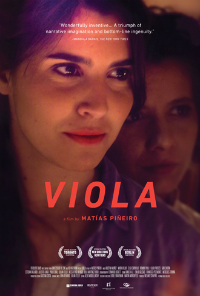Disc Reviews
Viola | DVD Review
 Without prefatory contextualization, Matías Piñeiro’s dreamily conceived Viola doesn’t make a whole lot of sense. We’re dropped into the production of an all-female Argentinian take on Shakespeare’s Twelfth Night where the character of Viola is tasked with finding the fancy of Olivia in the name of Duke Orsino, in doing ultimately blurring the lines of emotional truth between the trio. With the production title itself the only given, the implied narrative is something you’re expected to know going in and it’s ultimately the key to the elegantly compounded mystery written within. Strangely, you’ll likely be swept up in its perplexing hypno-theater whether you’re in on the narrative subtleties of Piñeiro’s film or not.
Without prefatory contextualization, Matías Piñeiro’s dreamily conceived Viola doesn’t make a whole lot of sense. We’re dropped into the production of an all-female Argentinian take on Shakespeare’s Twelfth Night where the character of Viola is tasked with finding the fancy of Olivia in the name of Duke Orsino, in doing ultimately blurring the lines of emotional truth between the trio. With the production title itself the only given, the implied narrative is something you’re expected to know going in and it’s ultimately the key to the elegantly compounded mystery written within. Strangely, you’ll likely be swept up in its perplexing hypno-theater whether you’re in on the narrative subtleties of Piñeiro’s film or not.
The production soon ends and we find ourselves in the dressing rooms, the cast of women peeling off their fake eyelashes and recounting their awkward eye-locking line deliveries from the night’s performance. Conversation breaks down into the mechanics of breaking up, as one cast member has made the decision to move out and cut ties with her soon-to-be ex. Seeming to carry her on-stage persona into the night, another cast member decides to test her co-star’s post-breakup ethos by wagering with her colleagues that she can seduce her. What’s most fascinating about the scene is it’s conversational causality, the camera strategically placed to minimize movement of frame, instead relying on depth of field between the women as they move in and around the set. Their youthful, modern worldviews echo of free spirited mumblecore meanderings, but Piñeiro’s favoring of tension creating long close-ups and extensive conversation feels much more in line with the resolve of Cassavetes than Bujalski or the Duplass Brothers.
Key to the tension in the following scene is repetition. Where the faux Viola pursues her wagered romantic interest by running a scene from the play in an unbroken loop. Each repeated line seems to bring her uncomfortably closer, until the tension is too much and her collaborating prey yields to a very real seduction. In this loop of acted out emotional play, Piñeiro and his talented pair of returning actresses break down the walls between theater and reality and immediately complicate the already convex narrative by introducing another Viola. This one real, she’s a delivery girl for her and a friend’s pirated DVD business named Metropolis, calling to mind not only Fritz Lang’s sci-fi monolith, but his first talkie, M, with their logo striking a very similar red letter stamped from carved potatoes on their packages. The dots begin to fall in line when Viola’s delivery seems to find her interrupting the previous scene’s tense seduction.
It seems as if by conversational osmosis that this Viola is enveloped into the interplay of theatrical unreality and emotional reality. We soon find out that Viola has been questioning her own relationship, and by working out scenes with her newfound theater friends, she comes to a decision through her own pursual of art. Again, the contextual key of Shakespeare’s original characterization is pivotal to extolling the full extent of Piñeiro’s deludingly dense film. Seemingly spontaneous and lackadaisical in plotting, Viola is a wonderfully jubilant and melancholy exploration of where art bleeds into life and back again. Piñeiro and his cast of actors harbor a rare cinematic ability to not only follow a whim, but convey the feeling of committing to it, living in it and finding satisfaction in doing so.
Disc Review:
As is becoming the usual for Cinema Guild releases, this disc comes packed with valuable supplements that help give a more in depth picture of the filmmaker at hand. Viola, in all its stunning close-up work and subtly blocked out shifting of depth looks quite stunning, highlighting the textures of skin and hair. The Dolby Digital track doesn’t have much opportunity to shine, as nearly the whole film is strictly dialogue, but its crisp and clean none-the-less. The disc itself comes in a standard DVD case.
Audio Commentary by director Matías Piñeiro and actress Agustina Muñoz
Explanatory in terms of the mechanics of his filmmaking and the structural concepts he employs, this track lacks only insight into the story itself. Agustina unfortunately rarely pipes in with remembrances of on set happenings.
‘And when I love thee not, Chaos is Come Again’, a play by Matías Piñeiro
Though performed for the stage, this is shot as though intended to be a short in and of itself, framed beautifully, edited insightfully. Featuring the same cast of actors, this piece served as the inspiration for Viola. 34 min
Preview of Matías Piñeiro’s new film, ‘The Princess of France’
This is but a teaser of the last film in Piñeiro’s Shakespeare inspired series, highlighting a painting while his usual rambling dialogue runs overtop. 2 min
Theatrical Trailer
As mysterious as the film itself, but with less of the charismatic tension that propulses the film forward. 2 min
Booklet
Featuring an essay on the film by Robert Koehler titled The Art of Surrender, which discusses the blurring of lines between theater and cinema.
Final Thoughts:
Viola is an oddly mesmerizing film that gently asks to be taken in as more a mysterious theatrical poem than something of traditional narrative lineage. Through intimacy, conversation and the art of acting itself, Piñeiro has woven a whimsical cinematic texture that manages to maintain its loose, yet precise emotional arc over and through his characters, as if passing an invisible emotional burden through the recited words of Shakespeare. Like the repeated dialogue within, at just 65 mins, the film itself is infinitely rewatchable, and thus, this release is invaluable.
Film: ★★★½/☆☆☆☆☆
Disc: ★★★★/☆☆☆☆☆



































